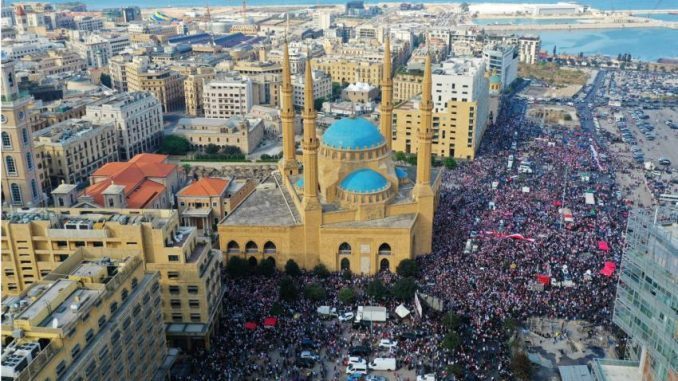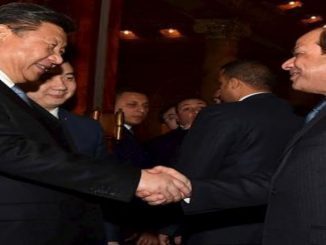
Several major Lebanese parties have agreed on nominating Mohammad Safadi, a former finance minister, as the prime minister of a new government.
The major political parties in Lebanon have agreed on naming former finance minister and businessman Mohammed Safadi as the prime minister of a new government, local media reported on Thursday.
Four political blocs agreed nominating the 75-year-old following a meeting between caretaker PM Saad Hariri and senior representatives of Parliament Speaker Nabih Berri and Hezbollah Secretary General Hasan Nasrallah.
“The blocs of Hezbollah, Free Patriotic Movement, Future Movement and Amal Movement agreed on naming Safadi as prime minister,” Lebanon’s The Daily Star reported citing an anonymous source.
The president’s office will need to call for a parliamentary session to officially deliver Safadi’s nomination, after which the prime minister-designate will work to form a new government.
Lebanon’s nearly one-month old protest movement, which first erupted in opposition to a proposed tax on calls made via free phone apps, has grown into a cross-sectarian outcry against everything from perceived state corruption to rampant electricity cuts.
Demonstrators say they are fed up with the same families dominating government institutions since the end of the 1975-1990 civil war.
The government stepped down on October 29 but stayed on in a caretaker capacity and no overt efforts have so far been made to form a new one, as an economic crisis has also battered the country.
Protesters have demanded a new government be composed of experts not affiliated with any of the traditional political parties.
Many protesters came out late on Thursday to demonstrate Safadi’s possible nomination.
Local media reported protesters rallied around Safadi’s residence in Tripoli.
“He is notorious for being corrupt. His nomination will fail before he even makes a government,” one protester said on live TV, according to The Daily Star.
Safadi’s wife, Violette, is a minister in the current caretaker cabinet.
In 2009, Safadi won the Tripoli seat in parliamentary elections, where he ran on Hariri’s electoral list.
From 2011 – 2014, he was finance minister in Najib Mikati’s government.
In 2006, The Guardian reported that Safadi was involved in Al Yamama arms deal through an anonymous offshore company, Poseidon.
The company was allegedly used to transfer money to Safadi, who was working for Prince Turki bin Nasser, Saudi royal and an air force officer at that time.
Fears over army violence against protesters
Lebanese protesters on Thursday and Friday demonstrated outside Beirut’s Justice Palace, decrying the detention of activists and allegations of violence against detainees. Dozens of demonstrators were reportedly detained overnight on Thursday. Activist Khaldoun Jaber was released on Thursday evening after spending 15 hours in detention.
In televised footage after his release from the Ras Beirut police station, Jaber took off his shirt to reveal bruises covering his back. He alleged the marks were sustained after Army Intelligence forces dressed in plain clothes arrested him at a demonstration in Baabda on Wednesday. “They dragged me and then took me to the Defense Ministry,” he said according to The Daily Star. Eyewitnesses confirmed Jaber’s account of being beaten by plain-clothes Army Intelligence officers.
Photos distributed on social media on Friday showed another protester, identified by journalist Luna Safwan as Fadi Nader, who had allegedly been beaten by security forces. The photos showed multiple black bruises and elongated red marks on the man’s back.
The spate of reported arrests comes as people demonstrated on Thursday against the reported appointment of former finance minister Mohammad Safadi as the country’s new prime minister.
While political factions reportedly agreed upon the Saudi-linked businessman’s nomination to replace former Prime Minister Saad al-Hariri, demonstrators took to the streets to oppose the decision.
Protesters in the northern city of Tripoli demonstrated outside Safadi’s residence, acccording to Al-Modon, and demonstrators in the capital returned to the luxury yacht and beach club Zaytouna Bay.
Lebanese demonstrators had last week occupied Zaytouna Bay, a luxury club built on illegally privatised public land which is widely seen as a symbol of corruption and the privatisation of Beirut’s coastline.
Activists reported army personnel, sometimes dressed in plain clothes, attacking protesters in at least two locations in an uptick of violence on Thursday night as the military vowed to re-open roads blocked by demonstrators after reports of Safadi’s nomination.
Family and friends of Samer Mazeh and Ali Basal, reportedly arrested at Beirut’s Ring Bridge on Thursday, gathered outside the Justice Palace on Friday morning.
“One person from a group of Army Intelligence, wearing civilian clothes, approached Samer and initiated a scuffle… Ali Basal, [Mazeh’s] friend, interfered. We tried to stop them [from arresting Basal and Mazeh] but we couldn’t,” a friend told The Daily Star.
A video shared on social media later on Friday indicated Basal and Mazeh’s release.
‘Criminalization of speech’
Human Rights Watch on Friday condemned Lebanon’s use of insult and defamation laws to “silence” journalists and activists discussing allegations of corruption and the country’s political and economic crisis.
Such discussions make up the bulk of chants by Lebanon’s unprecedented mass protest movement, now in its 30th day.
The human rights organization has called on Lebanon to repeal laws which criminalize speech.
“Criminal defamation laws are a potent weapon for those in Lebanon who want to silence criticism and debate about pressing social and human rights issues,” said Joe Stork, deputy Middle East director at Human Rights Watch. “At this critical juncture, Lebanese officials should safeguard, not stifle, free expression.”



